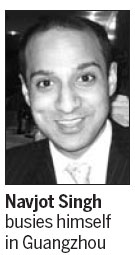Doing as the locals do to celebrate the New Year
Just like Westerners, who usually go back home for Christmas and (Western) New Year, for Chinese, the Chinese New Year is the time when people take a long and a well-deserved annual leave.
However, while living in China as a waiguoren I have realized that we foreigners also end up going home at this time of the year because it is not easy to get annual leave or take a holiday during the Christmas or Western New Year period. Although officially there is a three-day national holiday, the whole country comes to a standstill for about 14 days at the end of January (or the beginning of February depending on the lunar calendar), as people go back to their villages and towns; families and friends meet up and feast on fine food; and streets are lavishly decorated in bright red, yellow and gold colors - colors meant to bring prosperity and good luck.
Chinese New Year is the longest and most significant festival in the Chinese calendar. This year, the New Year - the Year of the Rabbit - falls on Feb 3, 2011.
As part of the celebrations, people wear red clothes and give each other gifts wrapped in red paper with poems written in yellow or gold. Children, young adults and newly married couples get "lucky money" in red decorated envelopes from elderly members of the family.

Now, this is the part that I like the best - the red envelopes. In all the years that I have lived in China, I have received plenty of "lucky money" from work because firstly I am single ("lucky money" is given to single by those who are married), and also I happen to have a very rich boss.
Red is a dominant color of the season because it symbolizes fire which, according to myth, can drive away bad luck, while gold and yellow are said to bring prosperity. The fireworks, a highlight of the celebrations, are similarly rooted in ancient custom.
Long ago, the Chinese lit bamboo stalks, believing that the crackling flames would scare evil spirits. It's a time when people forget the previous year, and start a new life. The whole ethos is built on the fact that the New Year will bring more happiness, prosperity and good luck.
I recall the first time I celebrated Chinese New Year in China back in 2002. It was nothing like the Chinese New Year celebrations that I was used to seeing in London. In London we would see a Lion Dance and lots of red confetti on the streets. Chinese friends would usually invite me for a joyous dinner or lunch. In China, of course, it's a different ball game altogether.
The majority of the Chinese New Year celebrations in London are concentrated around an area designated as "China Town"- and the same goes for any other city or country where celebrations are held outside China.
Another thing I realized was that the Chinese New Year decorations and the celebratory mood in London (and most Western cities) resembles Chinese New Year in Hong Kong rather than the mainland, as the vast majority of Chinese migrants outside Asia are from Hong Kong.
This further explains why I ended up confusing others, when I greeted my friends and colleagues in Beijing with Gong Xi Fa Cai (Happy New Year in Cantonese). It was only then that I realized that on the Chinese mainland, where Mandarin is spoken, the greeting is Xin Nian Kuai Le or Xin Nian Hao (Happy New Year).
People usually finish cleaning their homes and washing laundry, one or two days before the main day, as it's considered bad luck to do such housework on the first day of the new year.
I fondly recall the time I started to clean my home on Chinese New Year. Suddenly my house mate shouted at me and asked me to stop immediately (much to my shock, of course). About two weeks before Chinese New Year, the flower market in every city and town comes alive in the evenings as people making a beeline to all kinds of flowers.
The lotus flower and sunflower are highly sought after because they are thought to bring good luck and prosperity. These flower markets are almost like a heavily crowded funfair, where people also purchase other household decorations or gifts for the New Year. Sweet treats such as toffee-covered apples and sugar-coated strawberries are readily available and popular.
Just like Christmas for some Westerners, New Year in China really has no religious overtones and is more of a time of celebrating family ties and old friendships. But expatriates certainly aren't barred from the fun.
For the past few years, I have been lucky enough to join my friends and neighbors for the Chinese New Year lunch before heading off to watch concerts, while munching on peanuts and sunflower seeds. Of course, fresh mandarin oranges are also on the table. Chinese New Year is all about reuniting and being happy.
You may think that it is difficult for Westerners to take holidays during their festivals, but it is actually also tricky to take holidays during Chinese New Year outside of China for most Chinese people too. They would already have taken the Christmas holidays, and then have to take a few more days again in January or February - so it's more of a case of adapting to two different cultures.
The irony is that expats in China often only find out when spending Christmas and Western New Year in China what it feels like for Chinese in Europe and America who have to celebrate their special occasion away from loved ones.
The author is a British freelance journalist and photographer based in Guangzhou.
(China Daily 02/02/2011 page5)


















